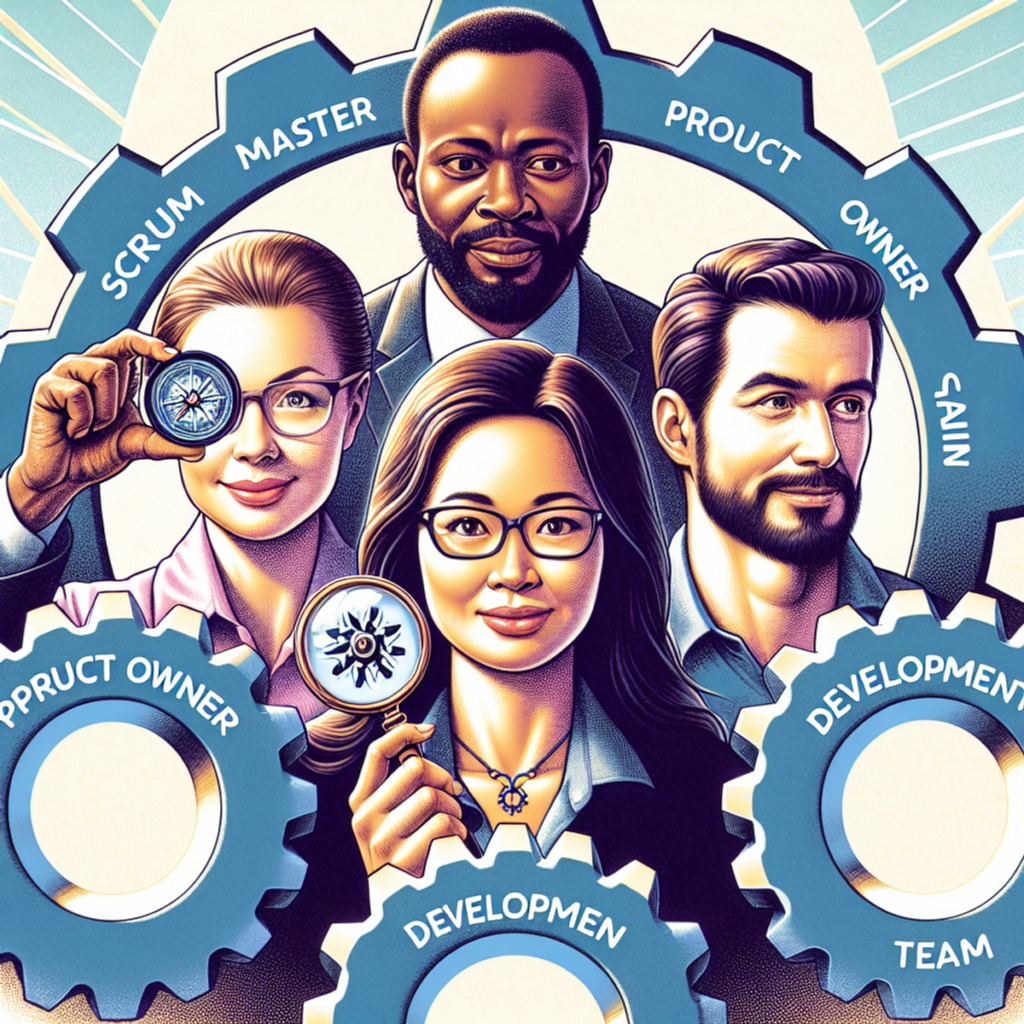
Scrum, is a powerful Agile framework for managing and delivering complex projects. With its roots in the software industry, Scrum has gained popularity across various sectors due to its emphasis on adaptability, quick delivery, and continuous improvement. Its success lies in the clear definition of roles and responsibilities within the Scrum Team, which consists of the Scrum Master, the Product Owner, and the Development Team. With defined responsibilities, successful Scrum Teams collaborate to achieve the sprint goal and contribute to overall business goals.
🕵🏻♀️ Scrum Roles and Their Significance for Agile Project Management
In the Agile world, Scrum roles play a crucial role in the framework’s operation and success. Unlike more traditional project management methodologies, Scrum emphasizes flexibility, collaboration, and efficiency. A typical Scrum team consists of five to nine people and includes three primary roles: the Scrum Master, the Product Owner, and the Development Team. For a Scrum Team to work together effectively, it is important to truly understand and outline the specific responsibilities of each Scrum role.
👨🏻🔧 Scrum Master: Guides the Scrum process, removes obstacles, and mentors the team towards self-organization.
👩🏻💼 Product Owner: Defines the “why” a product is being developed, “what” problems it will solve, and for “whom” while maximizing the value the product creates for the users, customers, and for the business.
👩🏻💻👨🏻💻 Development Team: Determines how to complete tasks assigned by the product owner and works together to achieve sprint goals.
Understanding these roles is crucial for any company that wants to build successful Scrum teams and use Agile methods. Next, we’ll explore each of these roles in more detail and learn about their specific responsibilities within a Scrum Team.
👨🏻🔧 Scrum Master: Facilitating Collaboration and Driving Continuous Improvement
The Scrum Master plays a crucial role in the Scrum framework. Their main responsibility is to ensure that the Scrum process runs smoothly by identifying and resolving any issues that may hinder team productivity. Unlike a traditional project manager or team leader, a Scrum Master serves as a servant leader. Instead of giving orders or making decisions on behalf of the team, they focus on facilitating, supporting, and empowering the team to work self-organized and effectively.
Here are the key characteristics of a servant leader:
- Build trust: They create an environment where every team member feels respected, valued, and comfortable expressing their opinions.
- Promote transparency: They encourage open communication, sharing information openly, and being honest about progress and challenges.
- Protector: They protect the team from outside interruptions and distractions, allowing especially developmet team members to focus on the work committed to the Sprint.
- Knowledgeable: They possess deep understanding of the Scrum framework to guide the Scrum team effectively.
A successful Scrum Master embodies these qualities and uses them to foster collaboration and drive continuous improvement within the team. They actively engage with all Scrum team members, understand their difficulties, and support them in overcoming any obstacles with empathy and courtesy. This way, they ensure that the Scrum framework is not only implemented but embraced by each team member, leading to efficient achievement of Sprint goals.
👩🏻💼 Product Owner: Navigating Priorities and Maximizing Business Value
The role of the Product Owner is also crucial in the Scrum. They have a big responsibility of making sure that the team is working towards satisfying customers and achieving business goals.
Here’s what you need to know about their main tasks:
- Bridge Between Team and Stakeholders: The Product Owner plays a crucial role in facilitating communication between the development team and stakeholders. They need to have good skills in managing stakeholders, making sure that their expectations are handled well and their feedback is incorporated into the development process.
- Effective Product Backlog Management: One of the most important things that a Product Owner should excel at is managing the product backlog. This means carefully prioritizing user stories, tasks, and bug fixes so that the team always works on work items that have a high impact and are aligned with customer needs and company goals.
- Setting Sprint Goals: The Product Owner combines market research, customer input, and business strategy to define meaningful sprint goals. These goals provide a clear direction for each iteration of work and help the team understand what should be prioritized.
- Defining Product Vision: Having a clear vision is essential for any project to succeed. The Product Owner has the challenging task of balancing different factors like market trends and business priorities to create a long-term vision for the product. This vision should be both inspiring and realistic.
By handling these responsibilities well, a Product Owner can maximize value delivery and ensure that the efforts of the Scrum team resulting in value for the customers and stakeholders.
👨🏻💻👩🏻💻 Development Team: Collaboration and Empowered Delivery
The Development Team is at the core of Scrum. It is a group of professionals who work together to achieve the Sprint goals. Here’s what makes the Development Team so effective:
- Self-Organization: The Development Team has the freedom to decide how they will accomplish their goals within each Sprint. There is no imposed work structure. This autonomy allows them to be more creative and innovative in their approach.
- Diverse Skills & Expertise:The Development Team consists of individuals with different backgrounds and areas of expertise such as coding, testing, designing, etc. This diversity brings a wide range of perspectives and ideas to the table, making problem-solving and product development more comprehensive.
- Cross-Functionality : One of the key strengths of the Development Team is its cross-functionality. This means that the Develpment Team possesses all the skills necessary to deliver the product Increment.
- Ownership & Accountability: Every Development Team member takes full ownership of the technical decisions and implementation details. They are responsible for turning items from the Product Backlog into working Product Increment that can potentially be released to users. This sense of ownership drives them to deliver high-quality work.
- Adaptability: With their diverse skills and ability to collaborate, the Development Team is well-equipped to handle changes and uncertainties during the Sprint. They can quickly adjust their plans and priorities based on new requirements or feedback, ensuring that valuable work is always being done.
Collaboration over Competition rather than competing against each other, a strong Development Team focuses on collaboration. They create an environment where every team member’s voice is heard and respected. This fosters creativity, boosts productivity, and keeps everyone aligned towards achieving their Sprint goals.
💡 Implementing Scrum Roles for Success: Best Practices
When aiming to harness the full potential of Scrum roles for project success, consider these practical tips:
✔ Invest in Certification and Engage in Active Learning:
Consider specialized training and certification for Scrum Masters and Product Owners. Certifications validate expertise and ensure a deep understanding of the role’s responsibilities. Further, Trainings provide interactive learning environments and knowledge sharing that are crucial for understanding and implementing the Scrum Framwork effectively.
💎 If you’re searching for the best Scrum Course provider, I highly recommend TheScrumMaster.co.uk. As an official partner of Scrum.Org and Scrum Alliance, they offer top-notch classes available both in-person and virtually across various time zones. Their prestigious clients include Google, NASA, the United Nations, Toyota, Coca-Cola, and Microsoft, just to name a few. 😉
▶ Scrum Master: Professional Scrum Master (PSM); Certified ScrumMaster (CSM)
▶ Product Owner: Professional Scrum Product Owner (PSPO); Certified Scrum Product Owner (CSPO)
For a Scaled Agile Framework (SAFe®) certification training, KnowledgeHut is an excellent choice. As a SAFe® Gold Partner, KnowledgeHut ensures that their trainers are knowledgeable SAFe experts with in-depth hands-on experience. Learners benefit from the latest insights, practical advice, and useful exercises.
▶ Scrum Master: SAFe Scrum Master Certification
▶ Product Owner: SAFe Product Owner / Product Manager
Save 5% at KnowledgeHut with code SPRING5
✔ Regular Retrospectives:
Conduct sprint retrospectives consistently. This is where teams can reflect on their dynamics, processes, and tools, then apply improvements iteratively.
✔ Promote Empowerment:
Ensure each role has the autonomy to execute tasks without micromanagement. Empowerment leads to a more motivated and accountable team.
✔ Cross-functional Training:
Facilitate cross-training among team members to foster a truly cross-functional team. This approach reduces bottlenecks and dependency on individual team members.
✔ Clear Role Definitions:
This is quite crucial. Define roles clearly but stay flexible to adapt as the team evolves. Clarity in role expectations prevents confusion and optimizes performance.
By integrating these best practices with an emphasis on education, certification, and empowerment, you create an environment conducive to productivity and continuous improvement.
Conclusion
Understanding and implementing Scrum roles – Scrum Master, Product Owner, and Development Team – can significantly improve your team’s performance and the value of the products you deliver.
Here are some key takeaways for each Scrum role:
- Scrum Masters should focus on facilitating collaboration, building trust, and driving continuous improvement.
- Product Owners should prioritize effectively, maximize business value, and bridge the gap between the development team and stakeholders.
- Development Team members should work together closely and have a wide range of skills to deliver high-quality results.

If you’re interested in learning more about Agile methodology and Scrum roles, there are many resources available:
- Books by experts such as Roman Pichler, Geoff Watts, Mike Cohn, and Jesse Fewell provide in-depth knowledge on Scrum. Read more here: Coomin soon.
- Training programs and certification courses offered by experts can help you further develop your skills. Recommended training provider:
🔹 TheScrumMaster.co.uk
🔹 KnowledgeHut: Save 5% with coupon code SPRING5 during checkout 😉
Start enhancing your teams´s dynamic and building high-performing teams with Scrum today! 🚀


